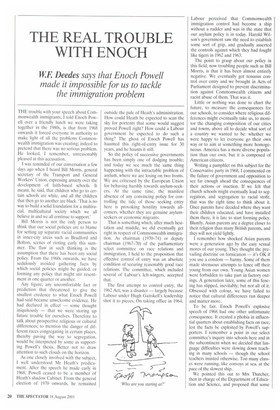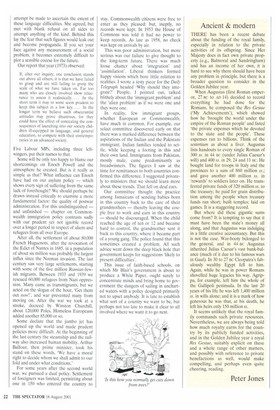THE REAL TROUBLE WITH ENOCH
WE Deedes says that Enoch Powell
made it impossible for us to tackle the immigration problem
THE trouble with your speech about Commonwealth immigrants, I told Enoch Powell over a friendly lunch we were taking together in the 1980s, is that from 1968 onwards it forced everyone in authority to make light of all the problems Commonwealth immigration was creating; indeed to pretend that there was no serious problem. He looked, I remember, unreasonably pleased at this accusation.
I was reminded of our conversation a few days ago when I heard Bill Morris, general secretary of the Transport and General Workers' Union, expressing anxiety over the development of faith-based schools. It meant, he said, that children who go to certain schools are white, and all the children that then go to another are black. 'That is no way to build a solid foundation for a multiracial, multicultural society which we all believe in and we all continue to support.'
Bill Morris is not the only person to think that our social policies are to blame for setting up separate racial communities in inner-city areas such as Bradford and Bolton, scenes of rioting early this summer. The flaw in such thinking is the assumption that there has been any social policy. From the 1960s onwards, we have sedulously avoided gathering facts by which social policies might be guided, or forming any policy that might stir resentment in one quarter or another.
Any figure, any uncomfortable fact or prediction that threatened to give the smallest credence to what Enoch Powell had said became unwelcome evidence. He had declared in effect — some thought iniquitously — that we were storing up future trouble for ourselves. Therefore to talk about prospective religious or cultural differences; to mention the danger of different races congregating in certain places, thereby paving the way to segregation, would be interpreted by some as supporting Powell's thesis. Better not to draw attention to such clouds on the horizon.
As one closely involved with the subject, I well understood Mr Heath's predicament. After the speech he made early in 1968. Powell ceased to be a member of Heath's shadow Cabinet. From the general election of 1970 onwards, he remained outside the pale of Heath's administration. How could Heath be expected to scan the sky for portents that some would suggest proved Powell right? How could a Labour government be expected to do such a thing? The ghost of Enoch Powell has haunted this right-of-entry issue for 30 years, and he haunts it still.
So the policy of successive governments has been simply one of dodging trouble; and today we see much the same thing happening with the intractable problem of asylum, where we are losing on two fronts. We are criticised by the European Union for behaving harshly towards asylum-seekers. At the same time, the manifest absence of any convincing policy for controlling the tide of those seeking entry here is provoking hostility towards allcomers, whether they are genuine asylumseekers or economic migrants.
That is something which, after much hesitation and muddle, we did eventually get right in respect of Commonwealth immigration. As chairman (1970-74) or deputy chairman (1967-70) of the parliamentary select committee on race relations and immigration, I held to the proposition that effective control of entry was an absolute condition of securing reasonably good race relations. The committee, which included several of Labour's left-wingers, accepted that.
The first attempt to control entry, the 1962 Act, was a disaster — largely because Labour under Hugh Gaitskell's leadership shot it to pieces. On taking office in 1964,
Labour perceived that Commonwealth immigration control had become a ship without a rudder and was in the state that our asylum policy is in today. Harold Wilson's government saw the need to establish some sort of grip, and gradually asserted the controls against which they had fought like tigers in 1962 and 1963.
The point to grasp about our policy in this field, now troubling people such as Bill Morris, is that it has been almost entirely negative. We eventually got tenuous control over entry and we brought in Acts of Parliament designed to prevent discrimination against Commonwealth citizens and racist abuse of them. That was it.
Little or nothing was done to chart the future, to measure the consequences for our schools, to consider where religious differences might eventually take us, to monitor the changing composition of our cities and towns, above all to decide what sort of a country we wanted to be: whether we were happy to let everyone go their own way or to aim at something more homogeneous. America has a more diverse population than our own, but it is composed of American citizens.
Writing a pamphlet on this subject for the Conservative party in 1968, I commented on the failure of government and opposition to see far enough ahead the consequences of their actions or inaction. If we felt that church schools might eventually lead to segregation, and segregation to racial strife, that was the right time to think about it. Once parents have decided where they want their children educated, and have installed them there, it is late to start forming policy. Bluntly, Asian parents are a degree closer to their religion than many British parents, and they will not yield lightly.
I remember how shocked Asian parents were a generation ago by the easy sexual mores of our young. They thought the prevailing doctrine on fornication — it's OK if you use a condom — barmy. Some of them made strenuous attempts to fence off their young from our own. Young Asian women were forbidden to take part in factory outings. A generation later, some of this fencing has slipped, inevitably; but not all of it. Obsessed with colour, we have failed to notice that cultural differences run deeper and matter more.
To be fair, Enoch Powell's explosive speech of 1968 had one other unfortunate consequence. It created a phobia in influential quarters about establishing facts on race, lest the facts be exploited by Powell's supporters. I remember a point in our select committee's inquiry into schools here and in the subcontinent when we decided that language difficulties were slowing down teaching in many schools — though the school teachers insisted otherwise. Too many classes were running, like convoys at sea, at the pace of the slowest ship.
We pointed this out to Mrs Thatcher, then in charge of the Department of Education and Science, and proposed that some
attempt be made to ascertain the extent of these language difficulties. She agreed, but met with blank refusal on all sides to attempt anything of the kind. Behind this lay the fear that such figures would leak out and become propaganda. If you set your face against any measurement of a social problem, it becomes extremely difficult to plot a sensible course for the future.
Our report that year (1973) observed:
If, after our inquiry, one conclusion stands out above all others, it is that we have failed to grasp and are still failing to grasp the scale of what we have taken on. Far too many who are closely involved show reluctance to assess it realistically.... In the short term it may to some seem prudent to keep this subject in a low key.. . . In the longer term we believe such obscurantist attitudes may prove disastrous, for they could have the effect of concealing the consequences of launching into our society children ill-equipped in language, and general education, to compete with their contemporaries in an advanced society.
Five Labour MPs, including three leftwingers, put their names to that.
Some will be only too happy to blame our shortcomings on Enoch Powell and the atmosphere he created. But is it really as simple as that? What influence can Enoch have had on our asylum policy — which shows every sign of suffering from the same lack of forethought? We should perhaps be drawn instead critically to examine a more fundamental factor: the quality of postwar administration. For this undistinguished — and unfinished — chapter on Commonwealth immigration policy contrasts sadly with our prudent yet not ignoble record over a longer period in respect of aliens and refugees from all over Europe.
After all, the settlement of about 80,000 French Huguenots, after the revocation of the Edict of Nantes in 1685, in a population of about six million was probably the largest influx since the Norman invasion. The last century saw very large settlements, starting with some of the five million Russian-Jewish migrants. Between 1933 and 1939 we rescued 60,000 refugees from Nazi oppression. Many came as transmigrants, but we acted on the slogan of the hour, 'Get them out now!', and war prevented many from moving on. After the war we took at a stroke, decreed by Winston Churchill, about 120,000 Poles. Homeless Europeans added another 85,000 or so.
Some declare that the jumbo jet has opened up the world and made prudent policies more difficult. At the beginning of the last century the steamship and the railway also increased human mobility. Arthur Balfour, then prime minister, took his stand on these words, 'We have a moral right to decide whom we shall admit to our fold and under what conditions.'
For some years after the second world war, we pursued a dual policy. Settlement of foreigners was limited, permitting about one in 150 who entered the country to stay. Commonwealth citizens were free to enter as they pleased; but, ineptly, no records were kept. In 1953 the House of Commons was told it had no power to keep records. As late as 1958, no check was kept on arrivals by air.
This was poor administration, but more serious was our failure to give thought to the long-term future. There was much loose chatter about 'integration' and 'assimilation'. Liberal thinkers formed happy visions which bore little relation to realities. I wrote a testy piece for the Daily Telegraph headed 'Why should they integrate?' People, I pointed out, talked blithely about the 'immigrant problem' and the 'alien problem' as if we were one and they were one.
In reality, few immigrant groups, whether European or Commonwealth, have much in common. For example, our select committee discovered early on that there was a marked difference between the aspirations of the Indian and the Pakistani immigrant. Indian families tended to settle, while keeping a footing in this and their own land. Immigrants from Pakistan, mostly male, came predominantly as breadwinners. The figures I saw at the time for remittances to both countries confirmed this difference. I suggested privately to ministers that we should learn more about these trends. That fell on deaf ears.
Our committee thought the practice among Jamaicans of sending babies born in this country back to the care of their grandmothers — thereby leaving the couple free to work and earn in this country — should be discouraged. When the child reached the age of ten or 12 and became hard to control, the grandmother sent it back to this country, where it became part of a young gang. The police found that this sometimes created a problem. All such advice went down the deep black hole that government keeps for suggestions 'likely to present difficulties'.
This issue of faith-based schools, on which Mr Blair's government is about to produce a White Paper, ought surely to concentrate minds and bring home to government the dangers of sailing in uncharted waters with a policy designed primarily not to upset anybody. It is late to establish what sort of a country we want to be, but perhaps not too late to make it clear to all involved where we want it to go next.



























































 Previous page
Previous page